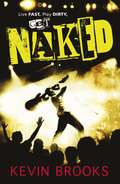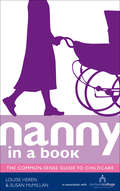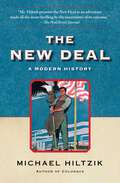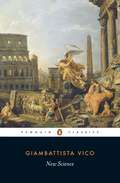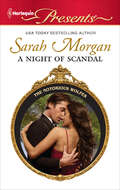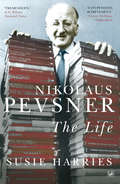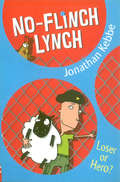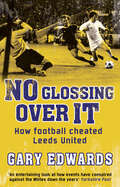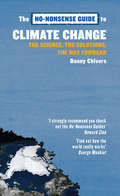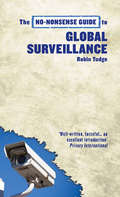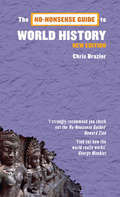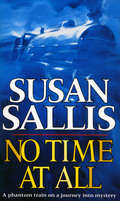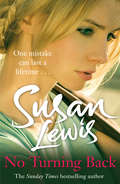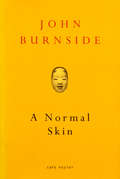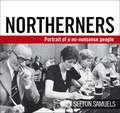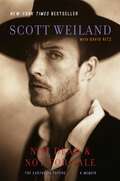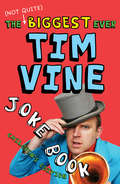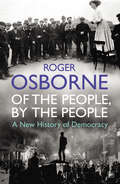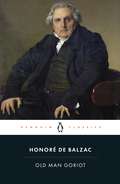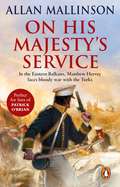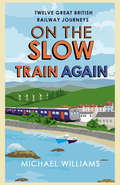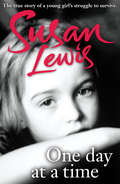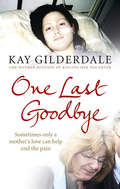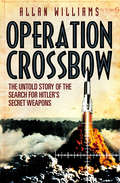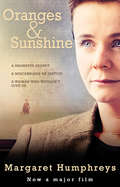- Table View
- List View
Naked
by Kevin BrooksLondon, 1976: a summer of chaos, punk, love . . . and the boy they called Billy the Kid.It was the summer of so many things. Heat and violence, love and hate, heaven and hell. It was the time I met William Bonney - the boy from Belfast known as Billy the Kid. I've kept William's secrets for a long time, but now things have changed and I have to tell the truth. But I can't begin until I've told you about Curtis Ray. Hip, cool, rebellious Curtis Ray. Without Curtis, there wouldn't be a story to tell. It's the story of our band, of life and death . . . and everything in between.This characteristically gripping novel from award-winning author Kevin Brooks will rock you to the core.
Nanny in a Book: The Common-Sense Guide to Childcare
by Louise Heren Susan McMillanThe English nanny is an institution. The image of the smartly uniformed, traditional nanny features in many books and films and there is something rather comforting about the idea of a 'no nonsense', nurturing and sensible childcare expert looking after your family.For over a century, Norland Nannies have cared for royal and celebrity families and are the best, most respected nannies in the world. Now their clear advice and straightforward methods - tried and tested on thousands of families - are brought together for the first time.Nanny in a Book is a practical companion to childcare that will help you with:* Setting up your nursery * Sleeping, weaning and potty training * Teaching your child good manners and behaviour * Nursing common ailments from sore tummies to measles * Organising a fabulous birthday party. Full of Nanny's top tips and personal stories, Nanny in a Book will become a trusted guide and a treasured companion - the next best thing to Mary Poppins herself sweeping in on the East wind and turning up on your doorstep.
The New Deal: A Modern History
by Michael HiltzikFranklin Roosevelt’s New Deal began as a program of short-term emergency relief measures and evolved into a truly transformative concept of the federal government’s role in Americans’ lives. More than an economic recovery plan, it was a reordering of the political system that continues to define America to this day. With The New Deal: A Modern History, Pulitzer Prize–winning writer Michael Hiltzik offers fresh insights into this inflection point in the American experience. Here is an intimate look at the alchemy that allowed FDR to mold his multifaceted and contentious inner circle into a formidable political team. The New Deal: A Modern History shows how Roosevelt, through the force of his personality, commanded the loyalty of the rock-ribbed fiscal conservative Lewis Douglas and the radical agrarian Rexford Tugwell alike; of Harold Ickes and Harry Hopkins, one a curmudgeonly miser, the other a spendthrift idealist; of Henry Morgenthau, gentleman farmer of upstate New York; and of Frances Perkins, a prim social activist with her roots in Brahmin New England. Yet the same character traits that made him so supple and self-confident a leader would sow the seeds of the New Deal’s end, with a shocking surge of Rooseveltian misjudgments. Understanding the New Deal may be more important today than at any time in the last eight decades. Conceived in response to a devastating financial crisis very similar to America’s most recent downturn—born of excessive speculation, indifferent regulation of banks and investment houses, and disproportionate corporate influence over the White House and Congress—the New Deal remade the country’s economic and political environment in six years of intensive experimentation. FDR had no effective model for fighting the worst economic downturn in his generation’s experience; but the New Deal has provided a model for subsequent presidents who faced challenging economic conditions, right up to the present. Hiltzik tells the story of how the New Deal was made, demonstrating that its precepts did not spring fully conceived from the mind of FDR—before or after he took office. From first to last the New Deal was a work in progress, a patchwork of often contradictory ideas. Far from reflecting solely progressive principles, the New Deal also accommodated such conservative goals as a balanced budget and the suspension of antitrust enforcement. Some programs that became part of the New Deal were borrowed from the Republican administration of Herbert Hoover; indeed, some of its most successful elements were enacted over FDR’s opposition. In this bold reevaluation of a decisive moment in American history, Michael Hiltzik dispels decades of accumulated myths and misconceptions about the New Deal to capture with clarity and immediacy its origins, its legacy, and its genius.
New Science: Translations, Commentaries, And Essays
by Giambattista VicoBarely acknowledged in his lifetime, the New Science of Giambattista Vico (1668-1744) is an astonishingly perceptive and ambitious attempt to decipher the history, mythology and laws of the ancient world. Discarding the Renaissance notion of the classical as an idealised model for the modern, it argues that the key to true understanding of the past lies in accepting that the customs and emotional lives of ancient Greeks and Romans, Egyptians, Jews and Babylonians were radically different from our own. Along the way, Vico explores a huge variety of topics, ranging from physics to poetics, money to monsters, and family structures to the Flood. Marking a crucial turning-point in humanist thinking, New Science has remained deeply influential since the dawn of Romanticism, inspiring the work of Karl Marx and even influencing the framework for Joyce's Finnegan's Wake.
A Night of Scandal (The Notorious Wolfes #8)
by Sarah Morgan“A fresh, funny globe-trotting romance”—first in the Notorious Wolfes series from the USA Today–bestselling author of The Book Club Hotel (RT Book Reviews, 4 1/2 stars).Nathaniel . . . Icon. Celebrity. Heartthrob.But underneath his movie-star good looks, he’s battling with the demons of his past. No one knows the real Nathaniel, they only see the pinup, the illusion he pretends to be.Then one night he is forced to rely on Katie Field, an ordinary young woman from a very different world. She may be starstruck but she isn’t blinded by the bright lights of fame. Can Nathaniel trust her enough to reveal the real man behind the mask?Let the seduction begin . . . “A great start to the series.” —Bewitching Bibliophile“Nathaniel is a terrific hero.” —Dear Author
Nikolaus Pevsner: The Life
by Susie HarriesBorn Nikolai Pewsner into a Russian-Jewish family in Leipzig in 1902, Nikolaus Pevsner was a dedicated scholar who pursued a promising career as an academic in Dresden and Göttingen. When, in 1933 Jews were no longer permitted to teach in German universities, he lost his job and looked for employment in England. Here, over a long and amazingly industrious career, he made himself an authority on the exploration and enjoyment of English art and architecture, so much so that his magisterial county-by-county series of 46 books on The Buildings of England (first published 1951 - 74) is usually referred to simply as 'Pevsner'. As a critic, academic and champion of Modernism, Pevsner became a central figure in the architectural consensus that accompanied post-war reconstruction; as a 'general practitioner' of architectural history, he covered an astonishing range, from Gothic cathedrals and Georgian coffee houses to the Festival of Britain and Brutalist tower blocks.Susie Harries explores the truth about Nikolaus Pevsner's reported sympathies with elements of Nazi ideology, his internment in England as an enemy alien and his sometimes painful assimilation into his country of exile. His Heftchen - secret diaries he kept from the age of 14 for another sixty years - reveal hidden aspirations and anxieties, as do his numerous letters (he wrote to his wife, Lola, every day that they were apart).Harries is the first biographer to have read Pevsner's private papers and, through them, to have seen into the workings of his mind.Her definitive biography is not only rich in context and far-ranging, but is also brought to life by quotations from Pevsner himself. He was born a Jew but converted to Lutheranism; trained in the rigour of German scholarship, he became an Everyman in his copious commissions, publications, broadcasts and lectures on art, architecture, design, education, town planning, social housing, conservation, Mannerism, the Bauhaus, the Victorians, Zeitgeist, Englishness and how a nation's character may, or must, be reflected in its art. His life - as an outsider yet an insider at the heart of English art history - illuminates both the predicament and the prowess of the continental émigrés who did so much to shape British culture after 1945.
No-Flinch Lynch
by Jonathan KebbeBright, sporty and popular, Lorcan Lynch seems to have it all. But when his heroic dad is jailed, Lorcan is sent off to an eccentric aunt in the West of Ireland. Here the city boy faces thorny challenges - a new school and its spiteful bullies, and a girl called Blaise who's looking for someone to help save ill-treated animals on a neighbouring island. Plagues by asthma attacks and self-doubt, has No-Flinch Lynch the courage - or the lungs - to lead a perilous rescue mission?
No Glossing Over It: How Football Cheated Leeds United
by Gary EdwardsBetween 1964 and 1992, Leeds United won eleven fabulous trophies, but the team were runners-up just as often. They missed out on many more titles and cups, not least club football's greatest prize, the European Cup, in 1975. In No Glossing Over It, lifelong Leeds United fan Gary Edwards reveals why the club has dramatically lost out on victory in many of these competitions and how it has been the victim of a pattern of serial abuse by the footballing authorities - most recently seen in the unprecedented 15-point sanction meted out at the start of the 2007-08 season. Featuring the views of former Leeds players and managers, as well as top-flight referees and diehard fans, No Glossing Over It examines the injustices that have befallen Leeds United and sheds new light on the shocking events that have long rankled with the club's supporters.
No-Nonsense Guide to Climate Change: The Science, the Solutions, the Way Forward (No-Nonsense Guides #3)
by Danny ChiversJust as the need for action on climate change becomes more urgent and overwhelming, the campaign to deny that humans are causing it has gained more traction. This completely new book meets the skeptics head on, offering a guide to the science, an insight into the politics of climate justice and a clear sense of the way forward. This is an ideal offering for students, academics and anyone interested in the growing issue of society’s impact on climate change and how to make climate justice a reality.
No-Nonsense Guide to Global Surveillance (No-Nonsense Guides #10)
by Robin TudgeSpying, once solely the domain of the KGB, CIA, CSIS, and MI5, has become part of everyday life. Governments routinely trawl our emails, closed-circuit security cameras follow us in malls, office buildings, and on street corners, while databases of our DNA and other personal details become larger all the time. This No-Nonsense Guide provides a well-researched look into the history of surveillance and how the process is carried out today with the aid of technology and often, lack of express consent.
No-Nonsense Guide to World History, 3rd edition (No-Nonsense Guides #30)
by Chris BrazierWho was the first black queen? How much do you know about China’s history? Most people’s knowledge of world history is hazy and incomplete at best. This updated No-Nonsense Guide gives a full picture, revealing the hidden histories and communities left out of conventional textbooks – from the civilizations of Africa, Asia and Latin America to the history of women. This updated and revised edition of one of the best-selling No-Nonsense Guides includes a new chapter from the perspective of the end of the first decade of the 21st century and includes material on the financial crisis and the world response to climate change. A perfect read for someone who wants to embrace the whole of history, rather than disconnected dynasties and events–all in one slim volume.
No Time At All
by Susan SallisTwo disabled children love their new bungalow by the sea. It even has its own spectral steam-train which only they can hear each night. The train holds many mysteries which will change their lives.
No Turning Back
by Susan LewisEva Montgomery is at the peak of her career when she is viciously attacked by a stalker. While still traumatised, she makes the biggest mistake of her life - one she can never turn back from.Sixteen years later, Eva has managed to rebuild her life in a way that seemed impossible after the attack. Her home in Dorset, high on the cliffs overlooking the sea, is as elegant as she is, but bears none of the scars. To an outsider, her world seems perfect in every way. Then the past invades the present - with shattering consequences. Hurt, frightened and confused, Eva struggles desperately to put right the terrible mistake she made sixteen years ago and finally break free from a past that nearly destroyed her.
A Normal Skin
by John BurnsideFrom memories of childhood and personal loss to the quiet celebration of a lover's navigational skills, from meditations on nature and sexuality to the fantasy world of aquarium fish, the poems in A NORMAL SKIN cover a wide range: lyrical in tone, and highly visual, they express once again the poet's sense of wonder at the world, while exploring some new preoccupations, including love and identity the tension between masking and self-revelation, and the writer's pleasure at returning to Scotland after a long absense. Most significant, however, is the continuing exploration of the relationship between self and other, and of the constant shifting of territory and boundaries, seen through the prism of love and home.
Northerners
by Sefton SamuelsThe word 'northern' conjures plenty of stereotypical images; men in flat caps, cobbled streets, pies and rain. But beyond the clichés lies a region rich in its diversity, devilish in its humour and fertile in its culture, and it is these characteristics that iconic photographer Sefton Samuels has captured faithfully over four decades, and are compiled here in Northerners.Described by the Guardian as 'the photographic equivalent of Ken Loach', Samuels shot legendary figures of northern life, from Alan Bennett to Morrissey, LS Lowry to George Best and Sir Ben Kingsley, but most famously and vividly he captured the realities of everyday life across the north. With snatched shots of children cheekily mugging to his camera, pictures of the more grandiose members of society at the local hunt, photos of the bleaker side of life with the riots in Moss Side, and snaps of the young and fashionable posing as they hang around with nothing to do, Northerners reveals a photographer at one with his subject; and a region whose open character was meant to be captured through a lens.
Not Dead & Not for Sale: The Earthling Papers, a Memoir
by Scott Weiland David RitzThe “shockingly honest” memoir by the iconic musician who fronted Stone Temple Pilots and Velvet Revolver, including personal photographs (Rolling Stone).In the early 1990s, Stone Temple Pilots—not U2, not Nirvana, not Pearl Jam—was the hottest band in the world. STP toppled such mega-bands as Aerosmith and Guns N’ Roses on MTV and the Billboard charts, and lead singer Scott Weiland became a compellingly charismatic front man in the tradition of Mick Jagger, David Bowie, and Robert Plant.Then, when STP imploded, it was Weiland who emerged as the emblem of rock star excess, with his well-publicized drug busts and trips to rehab. Written just a few years before his tragic death, this raw and revealing memoir delves into these experiences and more—his early years as an altar boy, his yearning for his father after his parents’ divorce, his complex relationship with the love of his life, Mary Forsberg Weiland, his traumas and heartbreaks. Readers also learn the fascinating stories behind his most well-known songs and what it was like to be there at the beginning of the grunge phenomenon. Not Dead & Not for Sale is a hard rock memoir to be reckoned with—a passionate, insightful, and at times humorous book that reads with extraordinary narrative force.“The tales he sketches out often are as poignant as they are cautionary.” —USA Today“A compelling and worthwhile read.” —Associated Press
The (Not Quite) Biggest Ever Tim Vine Joke Book: Children's Edition
by Tim VineComedian and TV star, Tim Vine, will have you laughing for hours with this new, abridged version of his hilarious joke book . . .Velcro.What a rip off.Why do you never see an elephant on a bus? Because he's got a massive bum.So I went to the doctors. I said, 'I got hurt in a pillow fight.' He said, 'You've got concushion.'Believe it or not there are twice as many eyebrows in the world as there are peopleI tried to surf the Internet and I fell off my chairRead it to find these funny puns, plus many more original jokes and illustrations. You won't be able to put it down!
Of The People, By The People: A New History of Democracy
by Roger Osborne'Democracy is the worst form of government, except for all those other forms that have been tried from time to time.'Churchill had more reason than most to rue the power of democracy, having been thrown out of office after leading Britain to victory in 1945. Democracy, when viewed from above, has always been a fickle master; from below it is a powerful but fragile friend.Most books on democracy focus on political theory and analysis, in a futile attempt to define democracy. Of The People, By The People takes the opposite approach, telling the stories of the different democracies that have come into existence during the past two and half millennia. From Athens to Rhaetia, Jamestown to Delhi, and Putney to Pretoria, the book shows how democratic systems are always a reflection of the culture and history of their birthplaces, and come about through seizing fleeting opportunities. Democracy can only be understood through the fascinating and inspiring stories of the peoples who fought to bring it about.
Old Man Goriot
by Honoré de BalzacMonsieur Goriot is one of a disparate group of lodgers at Mademe Vauquer's dingy Parisian boarding house. At first his wealth inspires respect, but as his circumstances are mysteriously reduced he becomes shunned by those around him, and soon his only remaining visitors are his two beautifully dressed daughters. Goriot's fate is intertwined with two other fellow boarders: the young social climber Eugene Rastignac, who sees a way to gain the acceptance and wealth he craves, and the enigmatic figure of Vautrin, who is hiding darker secrets than anyone. Weaving a compelling and panoramic story of love, money, self-sacrifice, corruption, greed and ambition, Old Man Goriot is Balzac's acknowledged masterpiece. A key novel in his Comédie Humaine series, it is a vividly realized portrait of bourgeois Parisian society in the years following the French Revolution.
On His Majesty's Service: (The Matthew Hervey Adventures: 11): A tense, fast-paced unputdownable military page-turner from bestselling author Allan Mallinson (Matthew Hervey #11)
by Allan MallinsonPerfect for fans of Patrick O'Brian, Bernard Cornwell and CS Forester, another captivating Matthew Hervey adventure from the pen of THE SUNDAY TIMES BESTSELLING AUTHOR Allan Mallinson. "Allan Mallinson...has done for the British Army what C. S. Forester and Patrick O'Brian did for the Royal Navy, and his novels are every bit as addictive...Splendid, irresistible stuff" -- ALLAN MASSIE, SPECTATOR"A fascinating, lively romp" - THE TIMES"With each successive novel, Mallinson grows in stature as an author; one looks forward eagerly to the next instalment of Hervey's life." -- LONDON EVENING STANDARD"Another great book from a brilliant author" -- ***** Reader review"Magnificent!" -- ***** Reader review"This is a must series to follow" -- ***** Reader review******************************************************************January 1829: George IV is on the throne, Wellington is England's prime-minister, and the population has been enjoying long-term peace. But this happy state of affairs means cuts in the army, and Hervey is told that his regiment, the Sixth, are to be reduced to a single squadron.With his long-term plans in disarray, he undertakes instead a six-month assignment as an observer with the Russian army. Soon Hervey, his friend Edward Fairbrother and his faithful groom, Private Johnson, are sailing north to St Petersburg, and from there to the Eastern Balkans, and the ferocious war between Russia and the Ottoman Empire.Hervey is meant to be an impartial spectator, but soon the circumstances - and his own nature - propel him into a more active role. In the climactic Battle of Kulewtscha, Hervey and Fairbrother find themselves in the thick of the action.For Matthew Hervey, the stakes have never been higher - or more personal.
On the Slow Train Again
by Michael WilliamsMichael Williams has spent the past year travelling along the fascinating rail byways of Britain for this new collection of journeys. Here is the 'train to the end of the world' running for more than four splendid hours through lake, loch and moorland from Inverness to Wick, the most northerly town in Britain. He discovers a perfect country branch line in London's commuterland, and travels on one of the slowest services in the land along the shores of the lovely Dovey estuary to the far west of Wales. He takes the stopping train across the Pennines on a line with so few services that its glorious scenery is a secret known only to the regulars. Here, too, is the Bittern Line in Norfolk and the Tarka Line in North Devon as well as the little branch line to the fishing port of Looe in Cornwall, rescued from closure in the 1960s and now celebrating its 150th anniversary taking families on holiday to the seaside. From the most luxurious and historic - aboard the Orient Express - to the most futuristic - on the driverless trains of London's Docklands Light Railway - here is a unique travel companion celebrating the treasures of our railway heritage from one of Britain's most knowledgeable railway writers.
One Day at a Time: A Memoir
by Susan LewisShe was only nine when her world fell apart. The struggle to understand took a lifetime.In 1960s Bristol, Susan's family was like any other with its joys and frustrations, and fierce loyalties. Then tragedy struck and left a legacy that was to last a lifetime.Susan was only nine when her mother died. A year later she was sent away to school. She didn't want to go, and didn't understand why she had to. In her struggle to cope with an uncertain world - a world where nothing seemed to make sense any more - she pushed away the one person she loved best, her father. It wasn't until adulthood beckoned that she realised that, in order to turn their relationship around, she had to learn to love - and trust - again.
One Last Goodbye: Sometimes only a mother's love can help end the pain
by Kay GilderdaleWatching her child die is the hardest thing a mother can ever do. But for Kay Gilderdale, saying a final goodbye to her only daughter Lynn was exceptionally painful: she'd played a part in her death.Lynn was just 14 when she was struck down by the crippling disease ME, leaving her paralysed and in constant agony. Over the next 17 years, she became desperate to escape her miserable existence, even begging her mum to help her die. So, one night, when Kay found Lynn attempting suicide, she was forced to make an impossible decision. Continue watching her child suffer or help her end the pain?Eventually, fighting her every instinct, Kay helped her precious daughter take a fatal overdose. But while Lynn was finally free, her mother faced a fresh agony - a possible lifetime behind bars. The highly controversial trial that followed opened a fierce public debate on assisted suicide. Is it murder or mercy?Here, in her heartbreaking story, Kay reveals the harrowing truth behind the headlines and the desperate lengths a mother will go to for the love of a child.
Operation Crossbow: The Untold Story of the Search for Hitler’s Secret Weapons
by Allan WilliamsThe story of the photographic intelligence work undertaken from a country house at Medmenham, Buckinghamshire, is one of the great lost stories of the Second World War . At its peak in 1944, almost 2,000 British and American men and women worked at the top-secret Danesfield House, interpreting photographs - the majority stereoscopic so they could be viewed in 3D - to unlock secrets of German military activity and weapons development. Millions of aerial photographs were taken by Allied pilots, flying unarmed modified Spitfires and Mosquitos on missions over Nazi Europe. it was said that an aircraft could land, the photographs be developed and initial interpretation completed within two hours - marking the culmination of years of experiments in aerial intelligence techniques.Their finest hour began in 1943, during the planning stages of the Allied invasion of Europe, when Douglas Kendall, who masterminded the interpretation work at Medmenham, led the hunt for Hitler's secret weapons. Operation Crossbow would grow from a handful of photographic interpreters to the creation of a hand-picked team, and came to involve interpreters from across the Medmenham spectrum, including the team of aircraft specialists led by the redoubtable Constance Babington Smith. In November that year, whilst analysing photographs of Peenemunde in northern Germany, they spotted a small stunted aircraft on a ramp. This intelligence breakthrough linked the Nazi research station with a growing network of sites in northern France, where ramps were being constructed aligned not only with London, but targets throughout southern Britain.Through the combined skill and dedication of the Crossbow team and the heroism of the Allied pilots, throughout late 1943 and 1944 V-weapon launch sites were located and through countermeasures destroyed, saving hundreds of thousands of lives, and changing the course of the war.Operation Crossbow is a wonderful story of human endeavour and derring-do, told for the first time.
Oranges and Sunshine: Empty Cradles
by Margaret HumphreysAlso published as Empty Cradles.In 1986 Margaret Humphreys, a Nottingham social worker, investigated a woman's claim that, aged four, she had been put on a boat to Australia by the British government. At first incredulous, Margaret discovered that this was just the tip of an enormous iceberg. Up to 150,000 children, some as young as three years old, had been deported from children's homes in Britain and shipped off to a 'new life' in distant parts of the Empire, right up until as recently as 1970.Many were told that their parents were dead, and parents often believed that their children had been adopted in Britain. In fact, for many children it was to be a life of horrendous physical and sexual abuse far away from everything they knew. Margaret reveals how she unravelled this shocking secret and how it became her mission to reunite these innocent and unwilling exiles with their families in Britain before it was too late.
